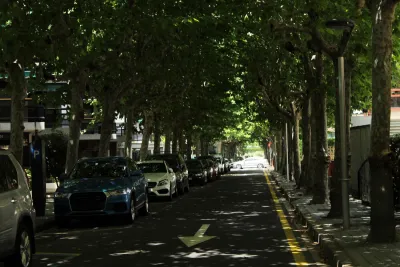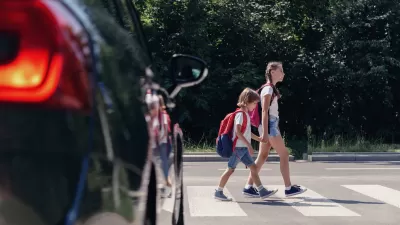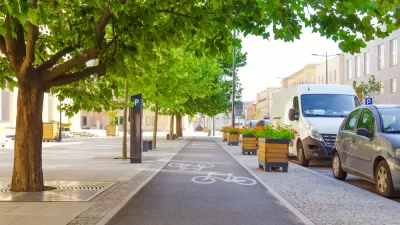Streets that offer more perceived obstacles and distractions can force drivers to slow down and drive more carefully.

New research reveals that streets that are more complex can be safer because they force drivers to slow down.
Chris McCahill explains the study results in a piece for the State Smart Transportation Initiative, noting that “When roads feel safer, drivers often compensate by speeding up and paying less attention.”
A Swiss study found that drivers slowed down when design elements such as street parking and trees were present. In a twist, the study showed that drivers actually felt safer driving faster on streets with bike lanes — potentially because they are less concerned about cyclists in their lane. Another study showed that “Drivers tended to go slower in areas with more buildings and grass medians, while speeds increased in open spaces with clear views of the sky.”
Research like this affirms the impact that the design of roadways, buildings, and street-adjacent features can have on driver behavior. “More complexity—whether through buildings, trees, or parked cars—can help keep speeds in check and streets safer for everyone.”
FULL STORY: Complex urban streets encourage safer driving

Planetizen Federal Action Tracker
A weekly monitor of how Trump’s orders and actions are impacting planners and planning in America.

Restaurant Patios Were a Pandemic Win — Why Were They so Hard to Keep?
Social distancing requirements and changes in travel patterns prompted cities to pilot new uses for street and sidewalk space. Then it got complicated.

Map: Where Senate Republicans Want to Sell Your Public Lands
For public land advocates, the Senate Republicans’ proposal to sell millions of acres of public land in the West is “the biggest fight of their careers.”

Maui's Vacation Rental Debate Turns Ugly
Verbal attacks, misinformation campaigns and fistfights plague a high-stakes debate to convert thousands of vacation rentals into long-term housing.

San Francisco Suspends Traffic Calming Amidst Record Deaths
Citing “a challenging fiscal landscape,” the city will cease the program on the heels of 42 traffic deaths, including 24 pedestrians.

California Homeless Arrests, Citations Spike After Ruling
An investigation reveals that anti-homeless actions increased up to 500% after Grants Pass v. Johnson — even in cities claiming no policy change.
Urban Design for Planners 1: Software Tools
This six-course series explores essential urban design concepts using open source software and equips planners with the tools they need to participate fully in the urban design process.
Planning for Universal Design
Learn the tools for implementing Universal Design in planning regulations.
Heyer Gruel & Associates PA
JM Goldson LLC
Custer County Colorado
City of Camden Redevelopment Agency
City of Astoria
Transportation Research & Education Center (TREC) at Portland State University
Camden Redevelopment Agency
City of Claremont
Municipality of Princeton (NJ)





























